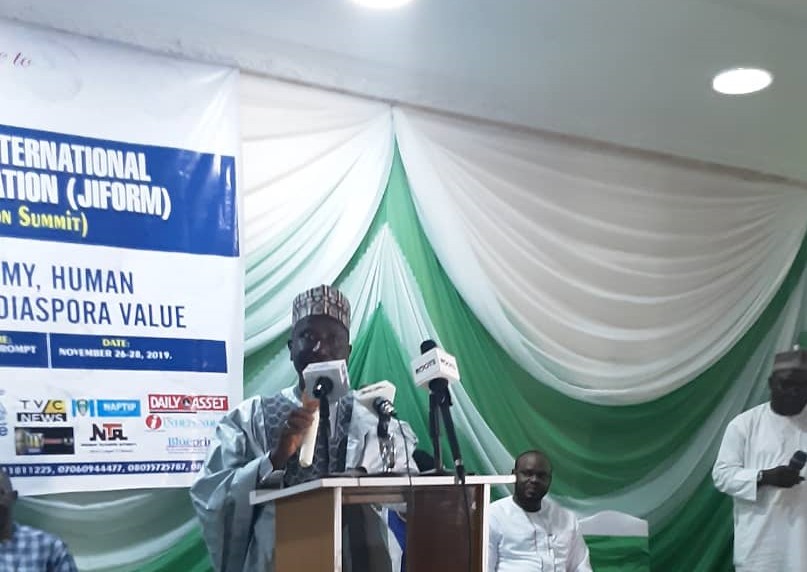The National Assembly has advocated for policies and programmes on peace building, peace stabilization, social cohesion among communities, social well-being and inclusion as well as transitional justice to guard against internal displacement of citizens.
The Chairman, House of Representatives Committee on Internally Displaced Persons and Refugees, Hon. Umar Jega who made the call in a keynote address at the Global Migration Summit held in Abuja on Tuesday by the Journalists international Forum for Migration (JIFORM) with the theme “The Economy, Human Security and Diaspora Value” said resolving internal displacement through preventive measures is seamlessly linked to achieving lasting peace while unresolved problems of displacement, on the other hand, may cause instability and thus threaten peace building efforts and escalate tension within the community.
Jega noted that the process of peace building is multi-faceted which according to him involves re-establishing security, law and order, reconstruction of the destroyed communities and economic rehabilitation of the returnees, reconciliation of parties involved and social rehabilitation of the societies to resume production of material means of existence such as farming among others.
He added that curbing crisis could be done through political transition which creates more accountable governance through establishing strong structures and institutions that would emphasize on peace building initiatives, conflict resolutions and respect for the rule of law.
According to him, “Be it as it may, the ways in which IDPs benefit from these processes may very well affect the success of nationwide peace building initiatives. For example, if the situation in communities of origin is not perceived as safe by displaced persons, they will not return or if they return, they may move again if security is inadequate.
“Indeed, on the other hand, durable solutions, particularly return, rehabilitation and re-integration cannot be achieved for internally displaced persons as long as there is a lack of security and harsh environmental conditions as well as conditions for sustainable solutions are not readily available.
“Similarly, if reconstruction and economic rehabilitation are not sufficient to enable the displaced persons to resume economic activities for their livelihoods, return will not be sustainable. Experience has shown that IDPs who do return can play an important role in rebuilding their homes and communities and thus in contributing to the economic development of the country.
“Ideally, political transitions need to take into account the peculiar needs of IDPs (needs assessment). For example, to enable them to vote on interim political arrangements and to participate in the political life of the country even before they return to their communities of origin. Thus, issues of reconciliation are closely related to issues of justice and to demand for restitution or compensation for losses which have been experienced by the returnees plays an important role in preventing future occurrence.
“So also, the way in which these issues are resolved will have a major impact on the sustainability of peace in the country. Helping displaced persons to return and reintegrate can simultaneously address the root cause of a conflict and help prevent further occurrence. Subsequently, the return of displaced population can be an important signifier of peace and end of conflict. Returns always play a significant role in validating the post conflict political order.”
The Chairman observed that in many countries, whether willingly or unwillingly, some IDPs had become party to the conflict adding that their inclusion is therefore necessary for conflict resolution.
On the other hand, returns that are not well prepared and managed may trigger new tensions with local communities or cause returnees to leave again and thus become a destabilizing factor. Consequently, government should come out as a matter of utmost importance, with policies and programmes on peace building, peace stabilization, social cohesion among communities , social well-being and inclusion as well as transitional justice to guard against future occurrence”, he concluded.
Photo: Chairman, House of Representatives Committee on Internally Displaced Persons and Refugee, Hon. Umar Jega.
Send your news, press releases/articles to augustinenwadinamuo@yahoo.com. Also, follow us on Twitter @ptreporters and on Facebook on facebook.com/primetimereporters or call the editor on 07030661526, 08053908817.

